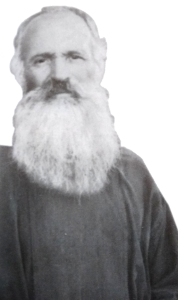
During his mission tour around Ajmer, Fr. Daniel contacted a few people around Singarchauri village and probably instructed and even perhaps baptized them In 1903, a school under the charge of Fr. Ferdinand was started for the poor students. But in 1904, fearing caste problems, the parents withdrew their children from the school. In 1907, probably, the school was closed down.
Fr. Simon who had arrived in India In 1909 and was at Khurda, was asked to take over this place and restart – the apostolic her Ft. Simon, discerned, that the best way to work here was to settle among the people, so he settled down in Singarchauri on 4th of April, 1912.
Fr. Prefect, tried to help Fr. Simon to work among the women here, decided to send some Mission Sisters. He hired a house close to the mission and asked them to open a school for the poor girls around here. But this did not suit Fr. Simon, he being a unique personality could not work with them. Inspite of the people not being very receptive. Fr Simon, on his own kept contacting and instructing the people around. On the eve of Christmas 1912, he baptised two children. The parents reacted and forced the children to renounce their new found faith, but the children did not yield. Their example was followed by others and so a little flocks, which was to be the nucleus of the future Christian community. On 3rd, February 1913, Fr Prefect confirmed Fr. Simon’s new converts behind closed doors. He would call them later “Confessors of the faith. ” But this new congregation, right from the start had to face relentless persecution.
To protect the new community from the attacks and persecutions of the caste Hindus around, and wishing to be even more in their midst. Fr. Simon persuaded Fr. Prefect to buy a plot of over five bighas in the village of Bhatta and he went there to stay with his chosen Ones.
Fr. Simon’s method was clear he would not concentrate on number, as instructed by the Prefect, Rather he would form an elite group with young people. In the meantime he had opened night schools in villages round about. The schools carried on more or less, but the pull of the caste seemed to be strongerthan the need for education.
Fr. Simon tried to instill an intense Christian life among his youth. He insisted that the young people come to the mission every evening after their work, he would give them spiritual instruction. After the instruction, there was prayer and the whole process was concluded by singing a hymn, Then Father chatted with the children in a familiar way. About his method, the Bishop remarked, that it seemed like a little novitiate.
Though this method of his was criticized by his companions and even the Bishop, this did produce results, because in spite of repeated persecutions, for most part the young people remained faithful. On and off there were persecutions on this new community. Fr. Simon was discouraged, but did not give up. Master Claude and Honore helped him in his work. Honore later left. Persecutions continued till 1915.
In July of 1917, the fever which had been besetting this missionary for many months obliged him to leave Bhatta and go to Indore for rest. He could only return in November. His baptized children were much affected by his long absence. Meanwhile influenza claimed many lives, even his school master Claude was sick. The missionary himself not being in too good health looked after the sick catechist and gave him whatever comfort he could, including his own pillow and treated him and saved him.
lnspite of the regular persecutions, the missionary continued and the people remained faithful. Discouraged by the regular persecutions, Fr. Simon, seriously thought of shifting his little flock to some other place, but the Bishop told him to stay on in Bhatta.
At the beginning of 1943, Fr. Simon felt feeble. He had felt stiff for many months and eventually had to go to the hospital. The doctors diagnosed tuberculosis of the lungs. He died in the Nursing home on 30th of December 1943, and is laid to rest in the Bhatta compound, where he worked for the Lord, all his life.
